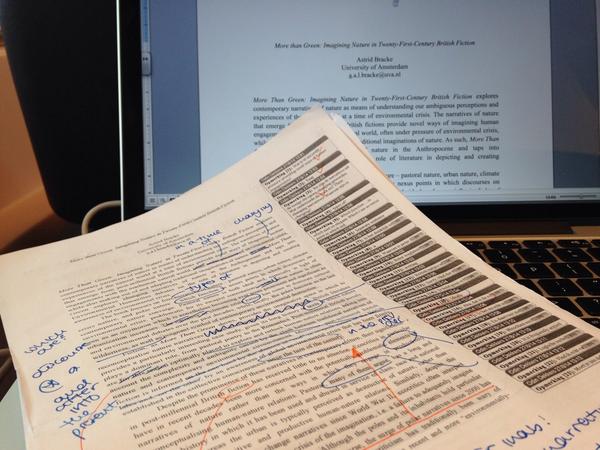 This is the first in a series of posts from Astrid Bracke regarding the process of moving from disseration to book. Astrid Bracke has a PhD in ecocriticism and contemporary British fiction and teaches English literature at the University of Amsterdam and HAN University of Applied Sciences.
This is the first in a series of posts from Astrid Bracke regarding the process of moving from disseration to book. Astrid Bracke has a PhD in ecocriticism and contemporary British fiction and teaches English literature at the University of Amsterdam and HAN University of Applied Sciences.
Over the past months I’ve been working on a book proposal for a monograph based on my dissertation. In this and the next three posts I’ll be sharing my experiences and advice on getting from finishing your dissertation to submitting a book proposal, and going on – hopefully – to publish a book. In this first post, I’ll be talking about making the decision to turn your dissertation into a book, and everything that comes with it.
It’s easy to follow the advice of only those in your Department, such as your supervisor and immediate colleagues. This may not be the best advice, though, no matter how well meant. For instance, in the Department where I did my PhD, most of my colleagues focused largely on articles – and barely on monographs. Hence, the advice to recent PhDs was to turn their dissertation into a series of articles, rather than seek to publish it as a monograph. Indeed, as I learned later, the monograph – while seen as the Holy Grail in many academic fields – is of considerably less importance in others.
Either way, it’s important to seek advice outside of your immediate academic environment, by asking external advisors or committee members, people at conferences or even following discussions on Twitter and using websites such as PhD2Published or The Research Whisperer. It can also help to look at job adverts when making this decision: they don’t always specifically list The Book as a requirement, but often do add a published monograph to their list of desired qualities.
That should be one of the first questions you ask yourself: how much do I need The Book for my career, or does a series of articles carry equal or greater weight in my field? Of course, in literary studies, the monograph is generally seen as very important, which made working on and submitting a book proposal important if I wanted to get a job outside of my own Department. At the same time, the dissertation doesn’t have to be your first monograph – although it will probably take longer to publish a book based on a wholly new project, than one based on your PhD project.
I deliberately gave myself a year from my PhD defense to decide whether or not I wanted to turn my dissertation into a book. During that year I didn’t look at my dissertation at all. Instead, I talked to people – mostly outside of my own Department –about their experiences and advice. The number one advice I got is that you should only turn your dissertation into a book if you can find the motivation to do so. If you cannot be enthusiastic about it, don’t take it on. Similarly, if you realize that large parts of your dissertation are already outdated, or make it unfeasible as a book for other reasons, you’re better off turning the best parts into articles – if you hadn’t done so already – and move on to a new project.
One of the biggest reasons why I eventually decided to turn my dissertation into a book is that I felt that otherwise the work I did in the four years it took me to write the dissertation would go to waste. I still believed in my dissertation as a whole, yet also realized that although I wanted to use the material, I also wanted to rework it. Consequently, the book proposal that I’ve now written describes a book that is more a spin-off from my dissertation than actually based on it.
In the following three posts I’ll discuss the next steps: writing a book proposal and deciding on a publisher.








Leave a reply